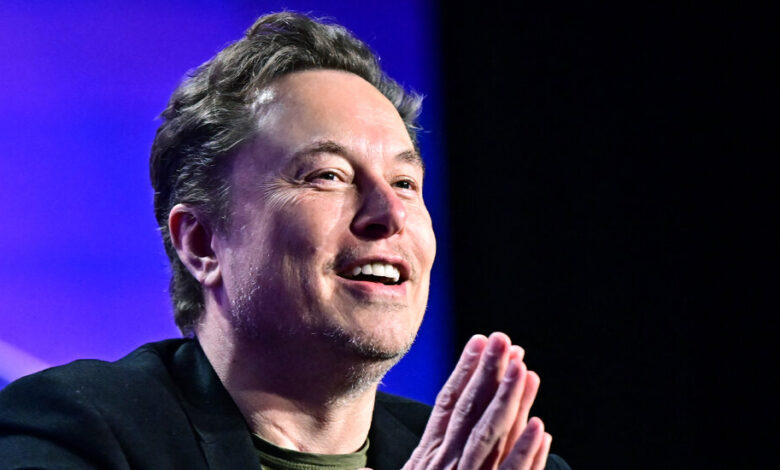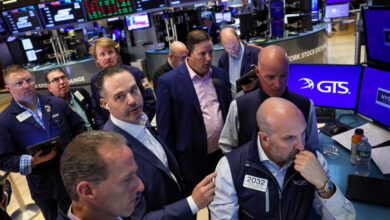What Elon Musk’s Convincing Win Means for Tesla

“Starting a new book”
Elon Musk got his way.
Shareholders in Tesla voted in favor of his two big asks, reaffirming a multibillion-dollar compensation package that a Delaware judge had nullified and approving the company’s reincorporation in Texas. “I think we’re not just opening a new chapter for Tesla, we’re starting a new book,” a jubilant Musk told shareholders at the company’s annual meeting.
The vote doesn’t end Tesla and Musk’s legal fights in Delaware, including over the compensation plan. But investors clearly believe that the electric-carmaker’s fortunes, and theirs, are inextricably linked to its C.E.O.
“We have the most awesome shareholder base,” Musk said Thursday. Tesla announced on Friday that 72 percent of votes cast at its annual meeting that aren’t held by Musk or his brother, Kimbal, were in favor of the pay plan. About 84 percent of votes cast, excluding the Musks’ shares, backed the reincorporation proposal.
DealBook hears that Tesla succeeded in getting retail investors, who were overwhelmingly supportive of Musk, to vote in far greater numbers than they usually do. But the company couldn’t have gotten the vote totals it did without support from Wall Street shareholders like Vanguard and BlackRock.
Wall Street thinks Tesla’s value is tied to keeping Musk happy. The company’s chair, Robyn Denholm, had urged shareholders to approve the proposals “to retain Elon’s attention and motivate him to continue to devote his time, energy, ambition and vision” to the business.
Musk critics pointed to moves that suggested he could undermine Tesla’s future if he didn’t get his way. Before the latest pay dispute, he had threatened to focus his artificial intelligence work at his other companies if he didn’t get greater voting control, and he admitted to diverting Nvidia A.I. chips meant for Tesla to X and xAI. (At least one new investor lawsuit filed in Delaware alleges that Musk essentially strong-armed shareholders to voting his way.)
The reincorporation vote also means Tesla will soon operate under Texas business law, which will likely be more management-friendly than Delaware’s. (Worth noting: The state will oversee future compensation for Musk.)
Shareholders essentially said that “we are comfortable with less judicial oversight of how Musk manages his companies,” Ann Lipton, a business law professor at Tulane University, told DealBook.
What limits does Musk now face? The pay plan vote doesn’t automatically mean his options are restored. It’s just another argument that Tesla can use to persuade the Delaware judge to reinstate the pay scheme.
But the vote confirms that investors think Musk is the only thing that separates Tesla from rivals. (The carmaker’s enterprise value multiple is three times greater than Ford’s and five times that of G.M.’s.) Tesla’s stock has fallen in recent months on investor concern about its outlook — but the vote shows shareholders are worried how much worse things could get without Musk’s full attention.
-
One question we have: What does the vote mean for the multibillion-dollar fee that the lawyers who have successfully challenged the pay plan in Delaware are seeking? If the presiding judge says the package remains nullified, they’re likely to still get lots of money. If she reverses course, they could be awarded far less — but they would then probably appeal.
HERE’S WHAT’S HAPPENING
Apple is once again the most valuable listed company. The iPhone maker’s stock has been on a tear since it announced a big push into artificial intelligence on Monday. Its $3.285 trillion market capitalization now surpasses that of Microsoft, in the latest reshuffling in the ranks of tech giants riding the A.I. boom.
The White House names its choice to run a top bank regulator. Christy Goldsmith Romero was nominated to replace Martin Gruenberg as chair of the Federal Deposit Insurance Corporation, after the agency was rocked by findings of a toxic workplace culture. But her confirmation by the Senate is far from certain, despite support from Democratic leadership.
Justice Clarence Thomas is found to have taken more flights on a billionaire’s private plane. The Senate Judiciary Committee released documents on Thursday showing that Thomas did not report three flights he took on a plane owned by Harlan Crow, a major Republican donor and co-founder of the low-tax lobbying group Club for Growth. The revelation adds to calls for greater transparency from Supreme Court justices.
Gov. Kathy Hochul of New York weighs a mask ban to fight antisemitism. Hochul said she is close to repealing a pandemic-era health measure that had relaxed an earlier prohibition on mask-wearing in New York City’s subways. The reversal comes after images and videos posted to social media showed masked anti-Israel protesters on subway trains making antisemitic threats to other riders.
The presidential pitches to C.E.O.s
In New York and Washington on Thursday, Donald Trump and the Biden administration offered starkly different visions on the economy to business leaders.
The former president promised more tax cuts and deregulation, while Treasury Secretary Janet Yellen warned that “supply side economics” weren’t good for sustainable growth or workers.
Trump pledged to cut the corporate tax rate to 20 percent, from 21 percent. His comments were made to a meeting of the Business Roundtable, the influential corporate lobbying group, in Washington; in attendance were some of America’s top C.E.O.s, including Jamie Dimon of JPMorgan Chase, Tim Cook of Apple and Doug McMillon of Walmart.
Many in the room liked what they heard. Trump cut the corporate tax rate to 21 percent from 35 percent in 2017, but the measure is set to expire next year. Even though business profits have boomed under Biden and stock markets are at record highs, many executives worry about the president’s plans to raise taxes on the wealthy and companies.
That said, Trump offered no detail (and later reportedly floated getting rid of income taxes altogether).
Biden has proposed raising the corporate tax rate to 28 percent. He also plans to maintain the tax cuts for lower and middle income Americans while allowing taxes to rise again for those earning more than $400,000, or on big inheritances.
Yellen focused on the middle and working classes. In a speech at the Economic Club of New York, she promoted the strong economy and said tax cuts for the rich and deregulation hadn’t boosted “growth and prosperity for many Americans.”
She also pointed to the administration’s investments in infrastructure, chip manufacturing and clean tech.
Biden’s team also stressed that stability is good for business. Jeff Zients, the White House chief of staff, said at the Business Roundtable event that policies Trump had previously backed, like mass deportation of immigrants and untargeted tariffs on Chinese imports, could add to inflation.
But some corporate leaders are skeptical of both candidates. As one attendee told The Financial Times: “We are facing the most disastrous combination of presidential candidates in the history of the United States.”
A big Supreme Court loss for the N.L.R.B.
The political right has been on a mission to limit the power of regulators like the Environmental Protection Agency and the Centers for Disease Control and Prevention. The movement just scored another victory against one of the nation’s top labor watchdogs.
The Supreme Court on Thursday sided with Starbucks in a case involving fired employees that could have big ramifications for the National Labor Relations Board. The agency could find it more difficult to intervene when a company is accused of illegally suppressing labor organizing.
A recap: The coffee chain fired seven employees in 2022 for, it said, allowing a television crew into a closed store in Memphis. The workers argued that they were fired for trying to organize a union.
The N.L.R.B. filed a complaint against Starbucks and asked a judge for an injunction to reinstate the workers. The judge granted it, a ruling that Starbucks challenged and that the Supreme Court overturned Thursday.
The decision could limit a powerful N.L.R.B. tool: the injunction. Such measures have the effect of discouraging companies from firing workers who try to organize. The court agreed with Starbucks’s argument that all federal courts should use a relatively strict standard when deciding whether to grant injunctions that reinstate workers.
It’s one of several recent cases that have challenged the authority of the N.L.R.B. In February, Amazon argued in a legal filing that the agency itself was unconstitutional, after similar arguments from SpaceX and Trader Joe’s.
What’s next? The Supreme Court is expected to decide two cases that could more broadly limit the power of executive agencies and threaten regulations in areas like the environment, health care and consumer safety.
Goldman toasts its I.P.O.
Goldman Sachs went public in 1999, 130 years after it was founded by the German immigrant Marcus Goldman to provide credit to merchants in New York City.
Last night, some of the bank’s current and former top executives gathered for steak, crab cakes, Caesar salad and Napa Valley wine at Delmonico’s restaurant in Manhattan to toast the bank’s 25th anniversary as a public company.
A Goldman who’s who attended. They included the three C.E.O.s since the offering: David Solomon, who took over in 2018; Lloyd Blankfein (2006-2018); and Hank Paulson (1998-2006), who took it public.
Also there: John Rogers, executive vice president and a longtime board-and-C.E.O. whisperer; John Waldron, president and chief operating officer; and John Thain, the Goldman president who became Merrill Lynch’s last C.E.O.
The I.P.O. was a watershed moment. At the time, it was the second-biggest listing of a U.S. company, and came after years of debate among the bank’s partners. “Goldman Sachs needed to grow significantly to meet the needs of our investing and corporate clients — the elephant was becoming too big for the partnership tent,” Paulson told The Financial Times last month.
Still, it’s taken time to become accustomed to operating as a public company; Goldman only held its first investor day in 2020.
The dinner capped a day of celebrations. Several Goldman executives rang the closing bell at the New York Stock Exchange Thursday. At the N.Y.S.E., Solomon interviewed Paulson about the I.P.O. and expansion in China.
THE SPEED READ
Deals
-
“The Hottest Investment for Hedge Funds Is Other Hedge Funds” (WSJ)
-
Blackstone is said to have significantly sweetened the offer price for its portfolio of student dorms, another sign of troubles in the commercial property market. (Bloomberg)
-
Keith Gill, the social-media provocateur and meme-stock ringleader, appears to have raised his stake in GameStop to more than nine million shares. (CNBC)
Elections, politics and policy
-
A federal judge said she was unlikely to approve a proposed legal settlement that would cap the fees that merchants pay Visa and Mastercard when they accept their credit cards. (WSJ)
-
Is Jeffrey Katzenberg, the Hollywood mogul, President Biden’s secret weapon against Donald Trump? (NYT)
Best of the rest
-
OpenAI added General Paul Nakasone, the retired military official and former head of the N.S.A., to its board. (Axios)
-
Evan Gershkovich, the Wall Street Journal reporter accused of spying on Russia, has been formally indicted by Moscow prosecutors. The U.S. government and The Journal deny the charges. (WSJ)
-
Wells Fargo fired more than a dozen employees last month for faking work by using “simulation of keyboard activity.” (Bloomberg)
We’d like your feedback! Please email thoughts and suggestions to dealbook@nytimes.com.



